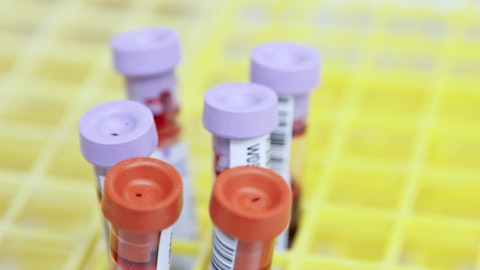Champions Oncology, Inc. (NASDAQ:CSBR) Q3 2023 Earnings Call Transcript March 17, 2023
Operator: Good day, everyone, and welcome to the Champions Oncology Third Quarter Fiscal Year 2023 Earnings Call. It is now my pleasure to turn the floor over to your host, Dr. Ronnie Morris, Chief Executive Officer of Champions Oncology. Sir, the floor is yours.
Ronnie Morris: Good afternoon. I’m Ronnie Morris, CEO of Champions Oncology. Joining me today is David Miller, our Chief Financial Officer. Thank you for joining us for our quarterly earnings call. Before I begin, I’ll remind you that we are making forward-looking statements during today’s call and that actual results could differ materially from what is described in those statements. Additional information on factors that could cause results to differ is available on our Forms 10-Q and Form 10-K. A reconciliation of non-GAAP financial measures that may be discussed during the call to GAAP financial measures is available in the earnings release. Overall, our financial results were weaker than our previous quarter. However, we continue to make good progress on strengthening our platform as well as furthering our drug discovery efforts.
As we reported last quarter, due to the macroeconomic environment we encountered some headwinds in our services business in 2 main areas: First, during our second quarter, we experienced a decline in quarterly bookings for the first time in over a year as we saw our customers reevaluating their discovery efforts and realigning priorities within their budgets given the new economic reality. This manifested itself by customers taking longer to commit to signing a study or not signing at all. Second, we saw an uptick in study cancellations, especially on the work that had not yet started. Both of these factors impacted future revenue. And as we indicated on last quarter’s call, our second half results will be adversely impacted. On a more positive note, I also discussed that despite these negative trends, we were seeing a strengthening of our bookings pipeline, and we were cautiously optimistic that we had turned the corner and weathered the worst of the decline.

Photo by National Cancer Institute on Unsplas
While we still need to reiterate the cautious sentiment, we finished our third quarter with a new record high in bookings, and we’ve started the fourth quarter with strong bookings as well. Cancellations are still higher than our historical average but have come down from the prior quarter. These positive developments should enable us to reaccelerate our revenue growth in next fiscal year, which starts May 1. With regards to our drug development effort, we continue to make good progress. Our lead discovery programs are progressing well through the therapeutic discovery stages. The 2 wholly-owned lead programs continue to advance with exciting results and we are now at a stage where we are beginning to collect in vivo data and therapeutic kits for each program.
These data sets will help to gauge the level of progression for these compounds and programs and the relative significance. We are also establishing in vitro data for the therapeutic kits established from the fan and collaboration with possible in vivo studies forthcoming. In summary, we view the third quarter and second half of the year as a bump in the road of our longer-term strategy. We continue to invest in expanding our platform and we are optimistic on our long-term growth prospects. We anticipate that our target discovery effort will progress into the preclinical stages, marking a significant milestone. Now let me turn the call over to David Miller for a more detailed review of the financial results.
David Miller: Thanks, Ronnie. Our full results on Form 10-Q will be filed with the SEC on or before March 16. As Ronnie mentioned, our previously disclosed bookings and an uptick in cancellations, as expected, impacted our third quarter financial results, leading to revenue of $12.8 million compared to $13.2 million in the year-ago period, a decline of 420,000 was 3%. Year-to-date, our revenue is $40.8 million compared to $36.2 million last year, an increase of 13%. For the quarter, we had a loss of $2.5 million compared to income of $829,000 in the year ago period. Excluding stock-based compensation and depreciation, we had an adjusted EBITDA loss of $1.6 million. Focusing as we view on results, excluding noncash expenses such as stock comp and depreciation, our total cost of sales was $7.5 million compared to $6.3 million in our third quarter last year, an increase of $1.2 million or 19%.
The increase was primarily from compensation expenses as we staffed our operational teams during the year to meet the demand of our expected bookings growth. While our revenue took a hit this quarter, Demand is still strong, and we anticipate the revenue downturn will be relatively short-lived. Accordingly, we kept our operations teams intact to meet the expected increase in study volume without any delays executing for our customers. As a result of maintaining our staffing levels on lower revenue, the gross margin was 41% versus 52% in the year-ago period. We anticipate a return to margins in the 50% range in our fiscal 2024. R&D expense was approximately $3.2 million compared to $2.2 million in the year ago period, an increase of $1 million or 47%.
The increase is primarily due to compensation expense in our discovery business along with sequencing and mice cost as we added proteomic data, , and replenished our TumorBank. Sales and marketing expense was $1.7 million compared to $1.5 million in the year ago period, an increase of $200,000 or 14%. Our G&A expense was at $1.9 million for the quarter compared to $1.7 million a year ago, a 14% increase. The increase was primarily due to compensation and IT expense as we invest in upgrading our infrastructure to support company growth. In total, our cash-based expenses were $14.3 million for the third quarter of fiscal 2023 compared to $11.7 million in the same period last year, an increase of approximately $2.7 million or 23%, with the increases primarily stemming from cost of sales to support booking growth and R&D for advancing our discovery efforts.
Now turning to cash. At the end of the quarter, we had $11.6 million of cash on the balance sheet, an increase of $800,000 from our prior quarter. For the quarter, net cash generated from operating activities was approximately $1.6 million primarily due to an increase in deferred revenue, which includes billings from recent bookings. Cash used in investing activities of $750,000 was for equipment purchases for our laboratories. Our balance sheet is strong with approximately $12 million in cash and no debt. In summary, we experienced an anticipated decline in revenue in the quarter primarily from an increase in cancellations on study signed during the first half of the year. The pace of cancellations has slowed, and we’re optimistic that the bookings reacceleration will continue, setting the stage for a return-to-revenue growth and positive adjusted EBITDA in 2024.
We’re well positioned to weather this small downturn, and we are excited about the company’s overall progression and long-term prospects. As our next call is for year-end results, the call will be in late July. We look forward to a positive outlook for 2024. We would now like to open the call for your questions.
See also 10 Best Stocks to Buy for the Next 10 Years and 15 Under-the-Radar High Dividend Stocks to Buy.
Q&A Session
Follow Champions Oncology Inc. (NASDAQ:CSBR)
Follow Champions Oncology Inc. (NASDAQ:CSBR)
Receive real-time insider trading and news alerts
Operator: Your first question is coming from Matt Hewitt from Craig-Hallum.
Matthew Hewitt: Maybe just trying to understand the difference here. So you’re having this period of increased cancellations, at the same time you’re announcing record bookings. And I’m just trying to mesh the two together, they seem to run counter to each other, if you could provide a little bit more color on what you’re seeing and hearing from customers?
Ronnie Morris: Yes, sure, Matt. So if we think about the delay between the bookings and revenue. So there were 2 things at play during this quarter from a revenue perspective. The first is the bookings that we — the weaker than our usual bookings quarter resulted in a lower revenue for this quarter, but that bookings — that weaker bookings quarter was from a previous quarter. So that was during the period of time when we were — when there was a lot of uncertainty. And I think there’s still, to a certain extent, is uncertainty out there, but there was a lot more uncertainty. And we were definitely seeing a — what I would say, a pause in a lot of our customers. Not sure what is happening with their budgets, so we saw a weakened quarter in terms of bookings, and that had an effect in terms of this quarter’s revenue.
This quarter, though, the sentiment, I think, came back and the bookings and the pipeline are much stronger. So that should — and that’s why I think our comments about starting Q1 next year, we really feel like we’re going to get back to where we were, and we’re going to get back to “where we left off” from this period. The second factor was we noticed during this period, and this period is, let’s say, August through November. We noticed a greater percentage than usual — than historical of cancellations. So people who had booked in previous quarters were reevaluating their budgets and were canceling some of their studies to reappropriate some of their budgets. So between those two factors, that was the largest contributors to the decreased revenue that we saw in this quarter.
Matthew Hewitt: Got it. As far as cadence, I didn’t hear an update on your full year guidance. I’m not sure if that means it’s the same or whatnot. But how should we think about cadence? How — I mean revenues recover a little bit here in Q4 before the big step up, it sounds like that we would see early in ’24? Or what should we be thinking for Q4?
Ronnie Morris: Yes. I think Q4 is going to look somewhat similar to kind of Q3 in that respect. I think we’re looking at the lower end of our guidance that we had given. I think that — what we’re seeing now with the pipeline with the cancellations coming back to normal rates, I think, is that we’re poised for Q1 to be back on track to kind of how we were imagining things. And Q3 and Q4, the latter half of this year is going to be weaker than we had expected.
Matthew Hewitt: Got it. And then as far as gross margins are concerned, historically, there — we’ve talked or you’ve talked about the mismatch between the costs when you start a new trial or a new service for a customer versus when you get to book those. That doesn’t appear to be the case here in Q3, unless I’m misunderstanding something. It sounds like this is more because of the cancellations, yet, you kept. And rightfully so it sounds like kept all your staff in place, anticipating that rebound. Did I hear that correctly? And…
Ronnie Morris: Yes.
David Miller: Yes. Exactly.
Ronnie Morris: I think you heard that correct.
David Miller: Yes. No, it’s — sorry. So Matt, yes, so it always is a factor actually that we have expenses in advance of our revenue. It’s not that, that’s not the case this quarter. But to really give you the flavor is — there was a much more important component and a much more — there was a different reality here. So — that always contributes, but because of this new reality. So I think that was the more important factor, and I think that’s the message we wanted to convey.
Matthew Hewitt: Got it. And then maybe one more, and I’ll hop back in the queue. But I’m wondering if we could get an update on how the Italian lab is performing. It’s now been, I think, a couple of quarters since it was open for business. Have you started to fill some of the opportunity there? And what are your expectations for that as we look out?
Ronnie Morris: Yes. So in general, the clinical biomarker, we opened the European lab in order to be able to access more clinical biomarker opportunities. I would say, in general, in the clinical biomarker opportunities, we are continuing to grow slowly, not as fast as we had expected. I think at this point, our operations are in good shape. We do really high-quality work. And now it’s more of a business development, getting the word out, making sure that people know that — even though we’ve always been known in the preclinical space as a very strong quality oncology provider that we’re also in the clinical space with a lot of the competitors out there. So I think it’s a little bit of a challenging time in the sense that trials are down globally.
And we’re just continuing to inch up and continuing to win more business just based on our quality. But it’s a work in progress. And I would say that we’re still — we still think this is a good addition to our suite of services, but certainly not the adoption that we expected a couple of years ago. The good news for us is that all the investment is kind of there. We’ve already built the labs. We have the expertise. Now it’s more of just making sure that we can get the word out that we’re not just a preclinical. We’re also clinical CRO and start getting more customers getting to be comfortable with using us.
Operator: That concludes your Q&A session. I will now hand the conference back to our host for closing remarks. Please go ahead.
Ronnie Morris: So I wanted to thank everybody for joining our quarterly conference call. Certainly, it was a challenging quarter in terms of the results. But in terms of our outlook, there’s a lot of positivity. We went through a challenging time, but we feel like we’ve — did it well. And the pipeline is strong. The interest is strong. Our operations are in a good place. And we’re excited about bringing everybody the results for the next couple of quarters. So have a good evening, and thank you for joining.
Operator: Thank you, everyone. This concludes today’s event. You may disconnect at this time, and have a wonderful day. Thank you for your participation.
Follow Champions Oncology Inc. (NASDAQ:CSBR)
Follow Champions Oncology Inc. (NASDAQ:CSBR)
Receive real-time insider trading and news alerts



